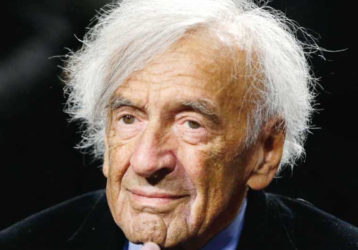(Reuters) – Activist and writer Elie Wiesel, the World War Two death camp survivor who won a Nobel Peace Prize for becoming the life-long voice of millions of Holocaust victims, died yesterday. He was 87.
Wiesel was a philosopher, speaker, playwright and professor who also campaigned for the tyrannized and forgotten around the world. He died at his home in New York City, the New York Times reported.

The Romanian-born Wiesel lived by the credo expressed in Night, his landmark story of the Holocaust – “to forget the dead would be akin to killing them a second time.”
In awarding the Peace Prize in 1986, the Nobel Committee praised him as a “messenger to mankind” and “one of the most important spiritual leaders and guides in an age when violence, repression and racism continue to characterize the world.”
Israeli Prime Minister Benjamin Netanyahu hailed Wiesel as a ray of light, and said his extraordinary personality and unforgettable books demonstrated the triumph of the human spirit over the most unimaginable evil.
“Out of the darkness of the Holocaust, Elie became a powerful force for light, truth and dignity,” he said.
Wiesel did not waver in his campaign never to let the world forget the Holocaust horror. While at the White House in 1985 to receive the Congressional Gold Medal, he even rebuked US President Ronald Reagan for planning to lay a wreath at a German cemetery where some of Hitler’s notorious Waffen SS troops were buried.
“Don’t go to Bitburg,” Wiesel said. “That place is not your place. Your place is with the victims of the SS.”





